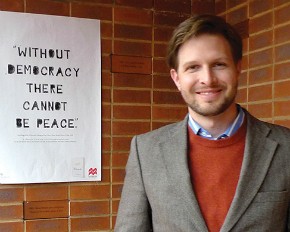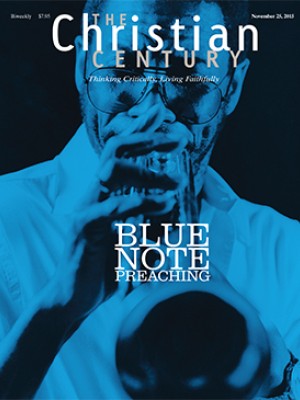Living by the Qur’an: Islam scholar Jonathan Brown

Jonathan Brown is the author of Misquoting Muhammad: The Challenge and Choices of Interpreting the Prophet’s Legacy, a book that examines the ways that Islamic scriptures are interpreted in the modern world. Brown is a professor of Islamic studies at Georgetown University and professor of Muslim-Christian Understanding in Georgetown’s School of Foreign Service.
Could you give me an overview of scripture in the Islamic tradition?
The Abrahamic traditions are all similar structurally. They all have a central written text, and surrounding that text, a variety of secondary scriptures that emerge out of the questions of interpretation.
In Islam, the primary scripture is the Qur’an, which is then read through the secondary scripture of the prophet Muhammad’s Sunna—what is known about the prophet’s life. One form of Sunna is called the Hadith, a record of the sayings of the prophet, and another is legal maxims established by early legal schools.
Read our latest issue or browse back issues.
But Islamic scripture is different from Jewish and Christian scriptures in that the time period is more compressed, more recent, and better documented. Even among Western scholars, there is not a lot of dispute about the document of the Qur’an itself.
There is much more controversy about the Sunna. Hadiths were not written down right away, and they were transmitted during a time when the Muslim community went through three civil wars. There was a tremendous amount of forgery, something early scholars acknowledged. They started a kind of science of authenticating Hadiths. That is a very open issue in Islam, and the science of Hadith criticism is itself a matter of open debate.
How significant is this distinction for the average Muslim? Where do they encounter each form of scripture?
For everyday Muslims, the scripture with which they have the most immediate contact is the Qur’an, which they believe is the literal word of God transmitted by the angel Gabriel to the prophet Muhammad in Arabic. When Muslims pray, which they in theory do five times a day, the Qur’an’s opening seven verses are always used, and then another selection from the Qur’an is also used. Muslims have to have memorized enough scripture to do these prayers.
Most Muslims don’t necessarily know a lot of Hadiths. They might know a little bit about the life of the prophet, but this might not be central to their faith.
You wrote about the interpretive tradition in Islam—how does it work? Who interprets and for what purposes?
First we have to understand what kind of book the Qur’an is. It is like a stream of divine consciousness. The meaning of the Qur’an is never the literal meaning of the Qur’an. Its interpretation is always based on a larger body of evidence: the Sunna of the prophet, the work of scholars after generations of interpretation, and other parts of the Qur’an. If you think about the Qur’an as a pretty strange book whose meaning is not evident on the surface, then you can understand why this broader interpretive context is necessary.
Understandings of the Qur’an are inherently problematic. There are four schools of law in Sunni Islam and two in Shi‘a Islam and many theological schools. To some extent they all recognize one another’s validity because they all recognize that there is work to do to interpret the words of the scripture.
In mainstream Sunni and Shi‘a Islam, Muslim scholars trained in classical traditions are called the ulama. They see themselves as the ultimate location of revelation. If you ask, “What does Islam want from you?” the qualified Muslim scholar is the one who knows how to apply the tradition in any given time and place. This is good for the ongoing tradition because the ulama can reshape the Shari‘a—Islamic law—according to new needs while remaining within its authentic vocabulary.
But Muslim scholars have to do this in a convincing way. They can’t just say, “This is what I think the Qur’an means.” Over the centuries, they’ve developed a number of strategies for this interpretive activity. You are always going to have a plurality of understandings. You end up with—this is not exactly an elegant analogy—a Mr. Potato Head bucket of parts, which you attach to the head. There are many legitimate understandings of the religion, but the parts can be put together differently.
What would be an example of this interpretive tradition at work for a contemporary Muslim?
What happens if a dog drools on my pants? According to three of the four schools of Sunni law, dogs are ritually unclean, and I will have to change my pants before I pray. But the Maliki school says that only pigs are ritually unclean, according to the Qur’an; the Maliki school doesn’t accept the Hadiths that say that dogs are ritually unclean.
There are a lot of friendly dogs in my neighborhood who lick me. What ruling should I take? The Qur’an says that God wants ease for his people. Using this maxim, I can choose the Maliki ruling because it helps me create more ease in my life living as a Muslim in America, but still falls within what God finds acceptable among God’s people and within the Islamic tradition of interpretation.
Where does a Muslim living in the United States go for an authoritative interpretation?
The United States is an unusual place. Say there is a 20-year-old Muslim man who has grown up in a well-educated family in northern Virginia. The imam at the local mosque may not speak English very well and may not be fluent in American culture. Will this imam be perceived as a religious authority by the young man? He may need to seek other sources of authority. In the United States there are classically trained Muslim scholars who have become well known through their speaking, online presence, and books—people like Hamza Yusuf or Zaid Shakir. There are also Muslim scholars overseas who might write in English or have their work translated and who can become sources of authority for Muslims living in the West.
Some Muslims now also say, “I don’t need a Muslim scholar to tell me what the Qur’an means. I can read it for myself. I am a well-educated person, and I don’t need this interpretive tradition.”
Since roughly 1900 a class of well-educated Muslims has developed who are not classically trained in the ulama. They are trained instead by universities. This class has a very different method of thinking and reasoning than the ulama. This is a new source of authority, a new voice.
Consider, for example, the interpretation of gay marriage in Islam. Lots of traditional members of the ulama have given their opinion about this. But recently in the New York Times, a Turkish journalist gave his opinion. Traditionally in Islam, that journalist wouldn’t necessarily have the qualifications to make a pronouncement, but that is less relevant today. There is a pluralization of sources of authority that can contest the ulama.
Can you cite an example of an interpretive controversy and how it is worked out in the tradition?
There is a verse in the Qur’an that says if a wife is guilty of extreme disrespect, then you should “encounter, admonish, leave her alone in her bed, and then strike her.”
Many people hold that this is an example of the Qur’an saying wife-beating is acceptable, and this creates a lot of problems for modern people.
The verse is not a Hadith, so you can’t say, “It is not reliable.” If Muslims start saying the Qur’an is not reliable, then they are not Muslims anymore. At that point, you cease to be a part of the conversation.
Within that limit, one option is to say, “God knows better than I do, so even though my reason fights against this, I have to go with what God says.” That leaves you with the idea that wife-beating is acceptable in Islam.
Another option is to say, “This was a verse given to a certain people in a certain time, and as societies develop, it is no longer applicable.” That’s fine, but then you have the problem of where else in the Qur’an is this the case. Maybe the prohibition on alcohol was just something given to those heavy-drinking Persians, and I as an American don’t need that anymore, and so on. By introducing that historical element into your interpretation, you open up a can of worms.
A better direction is to seek the proper meaning of the text within the interpretive community, within the Sunna of the prophet, and within the work of generations of Muslim scholars seeking faithful interpretation. There one learns that from early on in the tradition, scholars did not think it permissible for a man to beat his wife. Muslim scholars and judges are the ultimate authority of interpretation, and they have always said that a man striking his wife is not allowed.
But that leads to the problem of why the Qur’an appears to say one thing and the interpretive community says something different. At this point, you return to the realization that the Qur’an is a strange book whose meanings are rarely self-evident.
So one needs the interpretive tradition, even with all of its complexity and contradictions.
People who step outside the interpretive tradition are people like the guy who opened fire at the military base in Chattanooga. People who engage in extremist activities are almost to a one people who have decided, without the interpretive community and tradition, what a verse of the Qur’an means.
Even in Protestantism, Martin Luther, with his sola scriptura, argued that people needed the help of others to understand the meaning of biblical texts. Any community that survives in any ordered way has checks and balances on individual interpretation.
How does an Islamic society work within modern ideas of civil or secular authority?
Sunni Islam is extremely politically quietist. As long as the ruling authority is nominally Muslim, the ruler can be the worst Muslim in the world, oppressing and killing people, and people can’t do anything because Sunni Islam has long argued that anarchy is worse than a terrible ruler.
But what happens when the leader is not Muslim or builds a system that is not based on Shari‘a? Then there can be a rebellion. If a Muslim country bans headscarves, it is then creating the circumstances for political rebellion. It is directly contradicting generations of Muslim rulings on a particular subject. Good Muslims might be required to rebel.
For a few hundred years, however, Muslims have argued that there is nothing in the European legal code that contradicts Shari‘a, and so a people could adopt European governing systems and still have essentially an Islamic state.
During the Arab Spring, a number of traditional scholars argued that it is forbidden to rebel, but another group asked, why should we have to accept generation after generation of corrupt leaders, a never-ending kleptocracy? The pro-democracy movement is made up of Muslims who believe that they should be politically active, but they are not traditional scholars. They contended that traditional quietism is not an excuse for bad government. So somehow there has to be a reconciliation of these two groups, both claiming the tradition of Islam. The best future is probably one in which people recognize that the Muslim tradition needs to be able to replace leaders who are not accountable.







